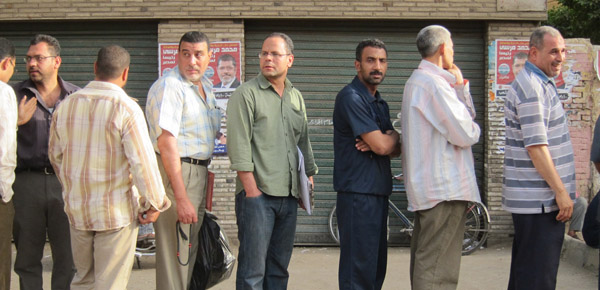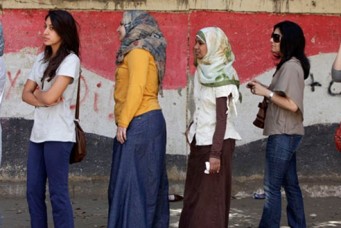Egyptians Making History
On Thursday, Egyptian politicians did something astonishing: they reached an agreement. A military ultimatum—agree within 48 hours on a formula for choosing the 100 people who will write the country’s next constitution, or expect a fresh constitutional declaration, the contents of which you may dislike—ended a long impasse. But the outcome sadly reinforces the narrative that only the military can press self-serving civilian politicians to fulfill their duties to the nation. More importantly, the “thirteenth-hour” agreement (the politicians actually missed the deadline) nonetheless throws Egypt’s already contorted transition deeper into confusion and uncertainty.

Egyptians voting in the first round of the presidential election, Cairo, May 23, 2012. Scott MacLeod for the Cairo Review
On Thursday, Egyptian politicians did something astonishing: they reached an agreement. A military ultimatum—agree within 48 hours on a formula for choosing the 100 people who will write the country’s next constitution, or expect a fresh constitutional declaration, the contents of which you may dislike—ended a long impasse. But the outcome sadly reinforces the narrative that only the military can press self-serving civilian politicians to fulfill their duties to the nation. More importantly, the “thirteenth-hour” agreement (the politicians actually missed the deadline) nonetheless throws Egypt’s already contorted transition deeper into confusion and uncertainty.
The original plan was for the constitutional assembly to finish its work and put a constitution to a referendum ahead of presidential elections. When that failed, many political actors expected the military to issue an updated constitutional declaration before the presidential vote. The military has now asked parliament to convene to choose the assembly members on June 12. Few expect the assembly to finish its work, or for a new interim constitutional declaration to be issued, before a president is elected in therunoff scheduled for June 16-17. But as one participant at Thursday’s meeting said, “The only thing certain now is that absolutely nothing is certain. Anything can happen.”
Particularly on questions where there is little agreement, a little ambiguity can be useful. And leaving the future constitutional assembly time to debate seems wise. But that the generals appear willing to conclude the presidential election, and their direct rule, under such constitutionally ambiguous circumstances is perhaps a sign of how confident they are that former Air Force Commander Ahmed Shafik will win.
Had the military attempted to isolate itself from presidential and civilian control, perhaps even under the guise of retreating from politics, and to assert that this arrangement must be enshrined in future constitutions, or supersede them, as its legal minds first attempted to do one year ago, this might have signaled that the military was willing even to prepare for the possibility of a victory for Muslim Brotherhood candidate Mohammed Morsi.
The military might yet be able to countenance a Brotherhood win provided the military is insulated from the president, parliament, and civilian courts. Such a deal, including the presidency, the cabinet (though perhaps with restrictions, such as on civilian ministers of interior and defense), and the parliament—in effect, all the levers of government—would perhaps be too sweet for the Brotherhood to resist. The military, in that scenario, would perhaps hope that they were giving the eager Brotherhood all the rope it needed, that if the Brotherhood could take the fall for the next five rotten years, the country might at last be rid of them. Former Supreme Guide Mohammed Mahdi Akef, in a sentiment shared by at least some middle managers, said he prayed the Brotherhood would lose.
For the moment, there is no indication that the Brotherhood or the military are moving toward such an arrangement. Even the current, Brotherhood-dominated parliament is on thin ice, awaiting a verdict on whether the law governing the elections that produced it is constitutional.
For the military, such an experiment would entail risks for an institution that is naturally particularly risk-adverse when it comes to its own future—which it conflates, with some justification, with that of the state. For should the Brotherhood be handed all the rope it needs to hang itself, it could just as easily fashion the noose with someone else in mind. “The Muslim Brotherhood are not idiots,” former intelligence head Omar Suleiman recently told a columnist for a Saudi daily.
If the military does not yet try to score an end run ahead of the polls by attempting to cement its immunity, independence, and, perhaps, decision-making role, by fiat, or with the hurried imprimatur of a constitutional assembly, it will signal that it views Shafik as a shoo-in. Indeed, Shafik might win even a fair election—he appears to have so far managed to pick up more of the center than has his opponent in their respective second-round pivots from their respective bases, though a great many, perhaps an absolute majority of, demoralized voters will abstain or spoil their ballots.
Morsi and the Brotherhood tentatively threw in their lot with the mass protests in Cairo, Alexandria, and elsewhere that erupted following the June 2 verdict in the trial of Hosni Mubarak, his sons, and various of their henchmen. But those protests found their wellspring first in the disenchantment of an urban electorate that wants neither someone from the old regime nor someone from the Brotherhood, and so are difficult for the Brotherhood to exploit for electoral gain.
In Cairo, after it was announced that he won the first round of elections in the city, almost everyone said they voted for charismatic Nasserist Hamdeen Sabahi—whether or not, one suspects, they had. Some of Morsi’s billboards have also been torn down. His painful flirtation with both Sabahi and Brotherhood defector Abdel Moneim Aboul Fotouh has not yet been consummated. Brotherhood members and those urging a boycott scuffle amid the tea-vendors of Tahrir.
Running the numbers on hypothetical electoral outcomes is now a favorite sport for Egypt-watchers. Both candidates won roughly a quarter of votes in the first round, and can count on their respective bases. But the decisions of the other roughly 50 percent of the voters who voted for neither candidate are difficult to predict. Shafik has picked up endorsements from small political parties, the former loyal opposition, and the tourism-worker association, and he can reasonably expect many who voted for former foreign minister Amr Moussa as a less divisive alternative to vote for him in the second round to keep the Brotherhood out. But much of the center was shocked by the recent acquittal of senior security officials and Mubarak’s sons, and by the judges’ conclusion that there was insufficient evidence to conclude that police killed protesters in January 2011.
By the same token, much of the center is alarmed by the prospect of the Brotherhood controlling both the presidency and parliament, and Morsi has not persuasively made his case to the dyed-in-the-wool opposition, some of whom have even said they will vote for Shafik, in order “to hasten the revolutionary dialectic,” or “to spark a second revolution.” Many, looking at the events of the last year, believe the Brotherhood would be happy to strike a deal with the military in exchange for power. As one disheartened first-round voter recently put it, the question is now “whether one prefers one’s dictatorship straight-up, or with a bit of religion mixed in.” Faced with such a choice, many will choose neither. Some will act on the streets.
Either way, the generals are perhaps banking on the notion that the battle for Egypt’s future will be fought on the terrain of institutions and laws, not on the pavements of Tahrir, that protests will eventually die down following concessions, crackdowns, fatigue, and despair. The Egyptian regime has survived similar periods in the past in similar ways.
If so, it is a tragic miscalculation: tragic for those who will yet lose their eyes, for the bereft mothers, for millions of poor people who will not find enough to eat, and for a new generation of disillusioned millions, who, like their parents had in the 1970s, dreamed of, fought for, and failed to secure a better future. But also tragic for the lasting damage to the prestige of perhaps the last two institutions in Egypt that had any: the military (a preoccupation a top general not long ago confided to the press he harbored) and, now that the courts have been drafted into the political fray, perhaps the judiciary.
In a way, Egypt is left where it was after the initial 18-day uprising, on the verge of a terrifying period of chaos—and perhaps, as many said they feared after the first-round elections, of killing—hoping the army’s intentions are pure. In the halo of the national catharsis and jubilation that erupted when the army did the right thing then and saved the country from chaos, some of those who are now among the generals’ most outspoken adversaries said they would give the military more than it dare ask for now. After a year of disappointment, mistakes, mismanagement, and, in extreme circumstances, soldiers’ use of force against protesters, fewer are willing to give the military the benefit of the doubt, a fact reflected in the recent resurgence of mass protest.
If Shafik makes good on his campaign promises to endeavor not to imprison people for their opinions and to achieve the goals of the youth’s revolution, rather than his campaign promises to use lethal force to disperse protests, Egypt will not be a utopia, but it will be better at the end of his term. The same, one hopes, might hold true if he makes good on his more surly promises (he praised the use of lethal force to clear a May protest in front of the Ministry of Defense, saying it was a small taste of what to expect under his rule, for example). It will just take more wasted blood to get there.
In such a situation, there is little Europeans and other foreigners who wish Egypt well can do. The challenge will be to maintain good relations with Egypt, the nation and the people, without entering into what will and should be an Egyptian struggle over the country’s future.
Egypt is in crisis. The best donors can do is try to minimize the suffering that crisis causes, by, for example, shoring up the currency, or by helping to ensure citizens have access to healthcare, clean water, and electricity. If Egypt’s next government backslides on human rights—on freedom of opinion or assembly for example—foreign governments can and should speak out clearly and publicly, but always as a frank disagreement among equals with a shared interest in Egypt’s prosperity and stability.
The stakes of the unfolding Egyptian drama are highest for Egyptians, and they are the only ones who can and should determine its outcome. But the actual economic and security costs, as well as opportunity costs, of an unhappy outcome in Egypt are too high for the rest of the region and the world to bear, at a time when both can least afford them.
Elijah Zarwan is a senior policy fellow for the European Council on Foreign Relations



